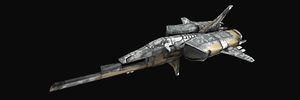Ship Scout USN Rapier
| Rapier | |
|---|---|
 Rapier | |
| Type | Interceptor |
| Combat role | Scout |
| Service | |
| Used by | United Space Navy |
| Wars | Second Antarean War |
| Specifications | |
| Length | 28m |
| Mod slots |
1x Primary weapon 1x Hardpoint 1x Chassis 1x Mines 1x Countermeasures |
| Statistics | |
| Hull | 600 points |
| Armour | 500 points |
| Boost time | 5s |
| Max thrust | 1500 |
For decades, Draymark Aerospace has been a leader in strike-craft design within the League. With the success of its Sword and Scimitar lines, the corporation was the most prosperous it had ever been. However, the staggering rate of losses within the USN fighter corps during Solesian War highlighted many fundamental weaknesses in Draymark's current models. The fighter corps of the Hegemonic Navy was largely composed of T191 "Tigershark" class strike-fighters, a Solesian design that, while inferior to USN fighters in terms armor and weaponry, consistently out-performed and out-maneuvered their opponents in almost very engagement.
The frightening death toll among Sword pilots easily convinced Draymark's designers that there was a definite need to correct the deficiencies within their existing line-up of strike-craft. Their answer to the Solesian T191 was the RPR-M30 "Rapier". The RPR-M30 was designed from the ground up to be a high-speed fighter-interceptor. Much of its frame is composed of light-weight ceramic-steel, which is remarkably sturdy despite being relatively lightweight. The craft lacks any weapons that would be menacing to larger-ships, and instead focuses on purely anti-fighter armaments. With its four Exeter-900 vulcans, it can easily chew through relatively light armor, while its massive, twin, Corsair-ASM mini-missile racks allow it to engage multiple moving targets at once, without requiring it to perform much additional maneuvering. The Rapier's huge Vector-Z92 PI Engine gives the ship the thrust necessary to reach an astounding sublight acceleration rate of 2271GPS, making it one of the fastest ships in service with the USN.
The Rapier has it flaws however. Despite the exclusion of heavy-weapon mounts in the design, the craft still pays for its speed and handling by sacrificing much of its armor coverage. As a result, pilots often equate flying a Rapier to being strapped to a "massive engine, and armed with pop-guns". Rapier pilots are often considered hot-rods by they're fellows. As one once remarked;
"Flying a Rapier does something to a man, its like riding on pure speed with no harness. One mistake, one late turn, one missed warning, and you'll just disappear. But its that feeling of constantly dancing on the edge that makes us who we are. We pilots of the USN know that we're the best, and that our lives are only as good as our reflexes. To us space is our playground and, ultimately, our graveyard. But that just makes every day a good day to die."